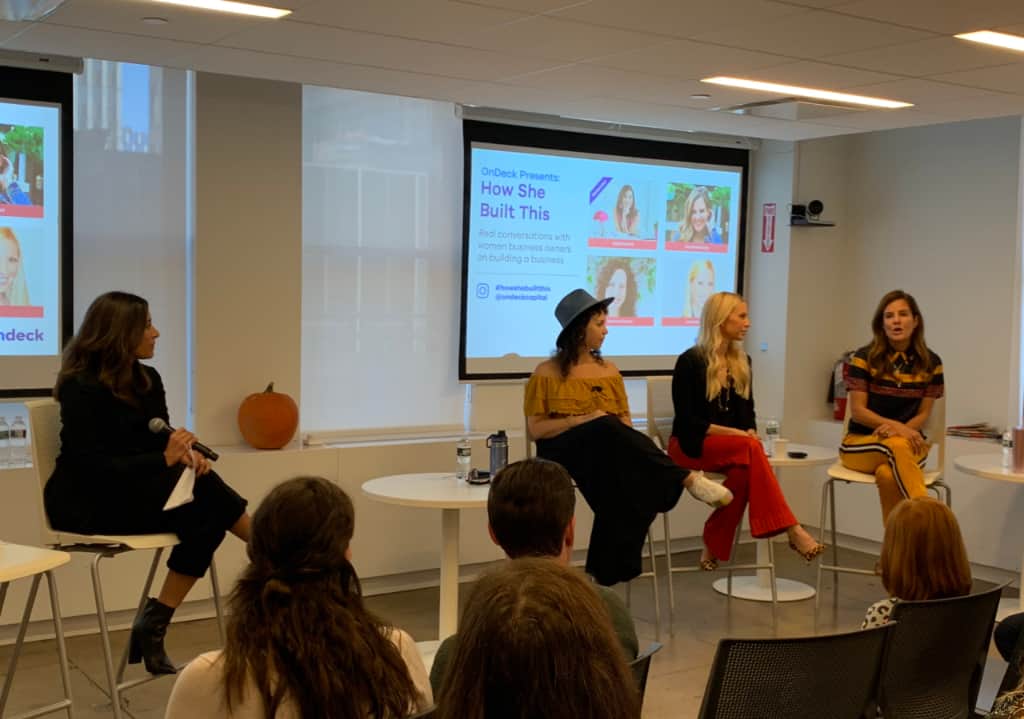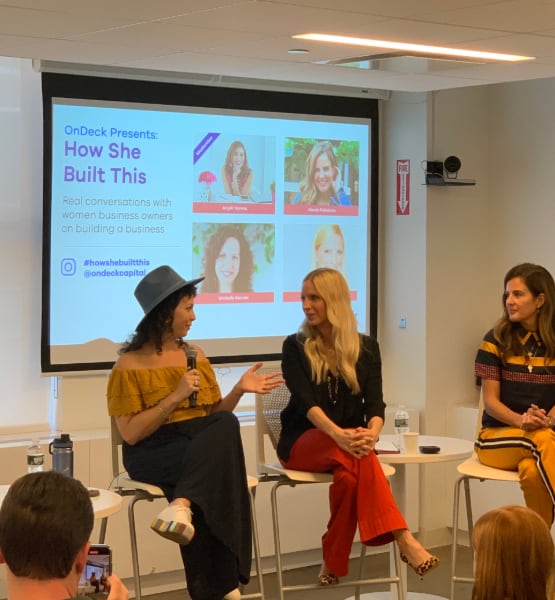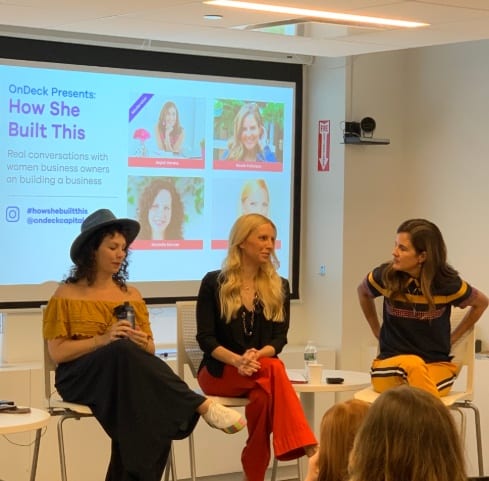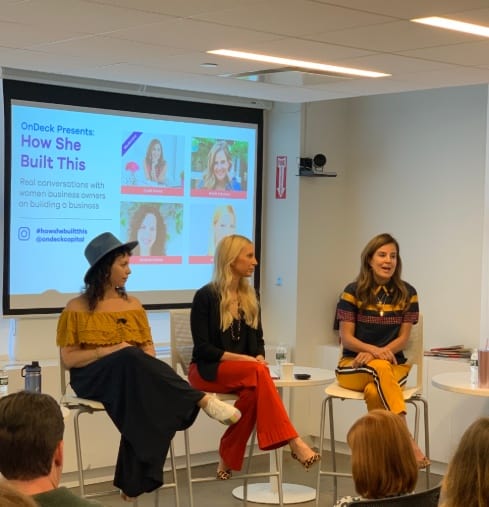Advice for Women Business Owners from Other Women Business Owners
Takeaways from our “How She Built This” panel events
As part of National Women’s Small Business month, we hosted “How She Built This” panels and invited successful female entrepreneurs to our offices in New York and Denver to share their stories on overcoming challenges when building a business. Our panelists offered tangible advice for women business owners who are looking to grow their business.
From financing issues to growing your business at a sustainable rate, they provided invaluable insights into how they’ve gotten to where they are today.
Read on for some tips from entrepreneurs who have been there on how to build and scale your business successfully, covering topics such as:
- What led you to start your business?
- Where did you get the initial financing for your business?
- How did you scale and grow your business?
- How do you successfully market a small business?
- What advice would you give to other female entrepreneurs?
What led you to start your business?

“How She Built This” Panel in our New York offices
Michelle Keinan, Co-Founder, City Wellness Collective
Many business owners are inspired to go out on their own when they need to fill a gap they found in the market for their own purposes. As Michelle Keinan of City Wellness Collective puts it, “the best business advice I ever got was to solve your own problem, because if you’re having that problem, other people are having that problem too”. As a wellness practitioner, Michelle had struggled to find a space in New York City where she could meet with her patients that was affordable and manageable. She eventually decided to create her own wellness center that prioritized taking care of practitioners as well as patients.
As she says, “Wellness centers may look nice in the waiting area, but what is going on behind the scenes is generally very stressful – how can anybody that’s working there be healthy? And if they’re not healthy, how can they take care of other people? So I knew that I wanted to create a place where I felt really good, and where I could have people around me that were supportive, and that weren’t just drained and hustling.”
Liza Huber, CEO & Founder, Sage Spoonfuls
Liza Huber, CEO & Founder of Sage Spoonfuls was similarly inspired to start her healthy baby food business. For years, Liza struggled to balance feeding her four children healthy food with holding down a full-time job. As she says, “I knew I wanted to make my children’s baby food, but I usually had to be at work by 6 AM. I said to myself, there must be a way to make this easier for parents.”
Where did you get the initial financing for your business?
Nicole Feliciano, Founder & CEO of Momtrends Media
There’s a lot of different ways to finance your business – from self-funding to taking out a business loan or borrowing from friends and family.
For Nicole Feliciano, Founder & CEO of Momtrends Media, she opted to grow her company slowly rather than taking on external financing. Nicole says, “Mom trends was entirely self-funded. When I started, the great thing is that I didn’t have inventory. And I always say, what’s the best business advice you ever took? We don’t have inventory. This made it easier to run on a shoestring budget. And I also just didn’t want to take money from men, and it was early in the process and we had a couple people who wanted to invest, but I just didn’t want to answer to the man, literally or figuratively. So I do think again, it controlled our growth, because I only was able to put in what we were making. I didn’t want anybody else. I wanted to really own it, and I’m super proud of what it is now, that we’ve just done it all. So I would say the conversation you need to have with yourself as a business owner is, how comfortable are you with somebody else having a say in your business?”

Michelle Keinan, Co-Founder, City Wellness Collective
Michelle Keinan, Co-Founder, City Wellness Collective
Similar to Nicole, Michelle also self-funded her business. When she initially looked to open her first wellness center, she struggled to get the funding to cover rent in the competitive New York City real estate market. As she says, “So we thought we’ll just open a small place to start. But the real estate market of New York does not take kindly to people with tiny budgets. Real estate agents were just like, we’re to people that had $40-$50,000 a month to spend on real estate. We didn’t have the funding.”
They continued to hunt for space for over nine months. Eventually they were able to find a more affordable location (the previous tenant was going bankrupt and need someone to take over the lease on short notice). To make rent, Michelle and her husband took the proceeds from selling their apartment and invested it all into their business.
Emilie Baratta, Owner, Gleam Car Wash
Businesses that are more capital intensive can require more planning and creative funding to get off the ground. Car washes, for example, require a large amount of funding for equipment, building lease, and so forth. Emilie Baratta, owner of Gleam Car Wash in Denver, offers some advice for women business owners in similar industries: “We got an SBA loan, and then also had to go out and raise equity as well, which was its own adventure. We’re required to be fiscally responsible because our investors are looking for returns on their investments. We focus on making sure every decision is the right decision for our business and our investors.”
Liza Huber, CEO & Founder, Sage Spoonfuls
Liza, on the other hand, opted for a loan from her husband and a relative. As she says, “it’s so hard to get a business loan and to get it off the ground. If you have the ability, whether it’s a spouse or a relative, friends or family, someone who is financially willing and able to help get you off the ground, that can be a wonderful opportunity. It can also be a complete raging disaster, because it depends. You have to have an agreement. Do these friends and family expect to be paid back? Is this a gift? Mine was expected to be paid with interest. So this was not a handout.”

Anjali Varma, Business Consultant and Owner of Kidville Bethesda
Anjali Varma, Owner, Kidville Bethesda
Anjali Varma, business consultant and owner of Kidville Bethesda, went the more traditional route by getting a SBA loan. As she says, “And I went the route of creating a business plan, and applying for the SBA loan, and getting the SBA loan to fund my business. It was definitely a lot of stress having to make that payment every month.”
How have you scaled your business? Did you take on external financing to scale?

Liza Huber, CEO & Founder, Sage Spoonfuls
Liza Huber, CEO & Founder, Sage Spoonfuls
For her first few years in business, Liza relied upon a combination of credit cards and a home equity line of credit for funds to grow the business. As she says, “It was a little bit scary because I couldn’t get a loan myself, so my husband became the sole guarantor for a $600,000 home equity line of credit.”
Eventually, she started looking for a business loan to scale even further. She says, “I had built a lot on credit cards. I kept pretending it was going to go away, but all the time my head was in the sand, my credit score was going in the toilet. So I had a really difficult time. On the outside, the business is booming and it’s amazing, but my credit score is in the toilet and I need money yesterday. Fortunately, my credit score was good enough to get an online loan. I got $75,000 but it was a pretty high interest rate because my credit wasn’t that great. But after was told six to 12 months of a perfect pay history we were able to renew the loan for $100,000.”
However, her business began to eventually grow faster than she could finance it: “We just launched into all 300 ShopRite stores. So launching into 300 stores, or 500 stores, or 600 stores, I’m now back on the fence – we need more inventory. I’m spending four weeks’ worth of cash in one week and need to grow my inventory 3X in a week. So I’m playing the shell game, and getting vendors to allow me to pay them on terms and stringing it out.”
To help smooth out her cash flow, Liza opted to take on a factoring agreement, as well as launch a crowdfunding campaign on iFundWomen. Rather than take on an external investor, she decided that “I want to retain ownership until I sell the company, and we’ve been making seven figures in revenue for four years now doing that. There’s just so many options available today.” To learn more about all the different types of financing available to businesses, check out “The Ultimate Guide to Small Business Financing.”
Michelle Keinan, Co-Founder, City Wellness Collective
After initially using personal finances to lease their first location, Michelle and her husband (who is her co-founder) took out a loan from family members. Similar to Liza, their loan was a true loan – they paid it back with interest. Once they had tapped out on family loans, they worked with their banker to find new ways to finance the business. Her advice for other women business owners is to do your homework: “we researched credit cards, and looked into what has 0% APR for as long as possible. How to move things around, and when that term was coming to an end, taking on a loan with the lowest interest rate possible. Re-financing. You have to do a lot of detective work.”
Advice for women business owners on marketing their business

Nicole Feliciano, Founder & CEO of Momtrends Media
Nicole Feliciano, Founder & CEO of Momtrends Media
Nicole recommends that you focus on developing a personality for your brand and look to meet your target audience where they spend the most time. For example, she says, “Develop a personality that’s super consistent across all of your channels. Then, if you’re looking to work with a partner or influencer, make sure you pick someone who is super relevant in your particular space (rather than one with the most numbers).”
Liza Huber, CEO & Founder, Sage Spoonfuls
Product-based companies require a slightly different marketing focus. As Liza says, “for product-based businesses, distribution is a huge deal and you have to decide really who is going to buy my product and where do I want to see my product? I started out by going to trade shows and events to meet consumers and influencers in the space. You can work with sales reps, which I’ve had both positive and negative experience with. You can also do it yourself. No one’s going to sell your product better than you anyway.”
Do you have any other pieces of advice for women business owners?
Charlene Meriwether, Co-Owner, Wild Women Winery
Co-owning a business can be great, since you have a partner to split the work with. However, it’s important to dedicate time to outlining each partner’s responsibilities to keep things running smoothly. Charlene Meriwether co-owns Wild Women Winery with her husband, and offers the following advice for women business owners who are considering taking on a business partner: “When we started in the business, we had what we call the responsibility matrix, and listed out all the possible work responsibilities. Then we literally determined who’s going to take the lead in each area and be the most responsible for it.”
Nicole Feliciano, Founder & CEO of Momtrends Media
Nicole recommends working on strengthening and bolstering skills that you feel are a weaker point. You can do this by hiring an expert or by building up those skills yourself (or a combination of the two). For example, she says: “Get really comfortable in the areas where you are uncomfortable. I like talking about big ideas and concepts, but I had to get really comfortable with managing our finances. Fortunately, we have a wonderful accountant who has worked with us for 10 years, and she has helped me get comfortable with cash flow, projections, and other parts of the business that initially seemed scary to me.”
Liza Huber, CEO & Founder, Sage Spoonfuls
Liza suggests focusing on your personal finances as well when building your business, as it’s a part of your overall business profile. As she says, “keep your personal credit score as high as possible, because if you’re going to bootstrap your business, they’re loaning to you. So keep your credit score as high as possible because you will have so many more options.”
Michelle Keinan, Co-Founder, City Wellness Collective
For Michelle, the most important thing has been to clearly define what she considers business success from the get-go. She says, “What is success anyway? There have been so many times when it looked like we were killing it and behind the scenes we just wanted to die. So, what’s it worth to you? Know what it’s worth to you. What do you want your life to be like? Because especially when you’re an entrepreneur, your business is your life. So make sure you know what your values are.”
And finally, our OnDeck leadership team offered advice to women business owners who are preparing to apply for external financing: “You never know when you’re going to need financing, whether something’s going to blow up on you, some opportunity’s going to be in front of you that you want to take advantage of. Be as organized as possible with your information, your business, your numbers, and your credit score. Know what you need the money for. Know what your payback on that is going to be. Have that ready in the back of your mind all the time, because you never know when you’re going to need it.”



